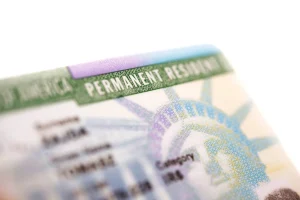Employment Based Visas – Permanent
Do you have extraordinary ability in sciences, arts, education, business, or athletics?
Are you an experienced, iternationally recognized professor or researcher?
Are you a skilled worker,
professional, or unskilled worker?
If you answered yes to any of these, there is a strong probability we can help. Our experience has enabled us to aid thousands of clients with their application processes, achieving a remarkable success rate of 99%.
Employment Based Visas – Permanent
At Abraham Benhayoun Immigration Law Offices, we specialize in navigating the complex landscape of permanent employment-based immigrant visas, covering five distinct preference categories. Our expertise extends from assisting individuals with extraordinary abilities in various fields, outstanding professors and researchers, to multinational managers or executives. We also guide professionals and workers in EB-2 and EB-3 categories, including those needing labor certification and National Interest Waivers. Additionally, we support special immigrants and religious workers under EB-4, and immigrant investors under EB-5, ensuring tailored legal strategies for each unique immigration goal.

Employment based immigrant visas are divided into five preference categories.
The first preference category (EB-1) is subdivided into 3 categories:
- Persons with extraordinary ability in the sciences, arts, education, business, or athletics. Applicants in this category must have extensive documentation showing sustained national or international acclaim and recognition in their fields of expertise. The most attractive feature about this immigrant visa classification is that it does not require a job offer. Applicants can self-petition as long as they intend to continue to work in the field in which they have an extraordinary ability.
- Outstanding professors and researchers with at least three years experience in teaching or research who are recognized internationally. Applicants in this category must be coming to the U.S. with a job offer from a university or another institution of higher education.
- Multinational managers or executives who have been employed for at least one of the three preceding years by the overseas affiliate, parent, subsidiary, or branch of the U.S. employer. Generally, applicants for this immigrant visa classification first obtain an L-1A visa. However, having an L-1A visa first, is not required.
The second preference category (EB-2) is designed for professionals holding an advanced degree (beyond a baccalaureate degree) and persons of exceptional ability in the sciences, arts, or business. Exceptional ability means having a degree of expertise significantly above that ordinarily encountered in the sciences, arts, or business. This category typically requires a job offer from a U.S. employer and a labor certification, except in cases where the applicant qualifies for a National Interest Waiver (NIW), which allows them to bypass the job offer and labor certification requirements if their work is deemed to be in the national interest of the United States.
EB-2 National Interest Waiver: The EB-2 NIW is an immigration visa that lets professionals with advanced degrees or exceptional abilities bypass the typical job offer and labor certification requirements by demonstrating their work’s significant national benefit. It’s for individuals whose expertise or contributions directly impact and serve the national interest of the United States.
The third preference category (EB-3) is for skilled workers, professionals, and unskilled workers. Skilled workers are individuals whose jobs require a minimum of 2 years training or work experience that are not temporary or seasonal. A professional includes members of a profession whose jobs require at least a baccalaureate degree. Unskilled workers are persons capable of filling positions that require less than two years training or experience that are not temporary or seasonal.
The first steps toward an employment-based permanent visa is a process that is referred to as the Labor Certification. Applicants for an EB-2 or EB-3 must have their employer obtain a labor certification approval from the Department of Labor. We assist our clients in the critical selection of the most feasible type of employment petitions according to their professional background.
The fourth preference category (EB-4) is for certain special immigrants including religious workers. Ministers and non-ministers in religious vocations and occupations may obtain permanent residency in the United States for the purpose of performing religious work in a full-time compensated position for a legitimate religious organization.
The fifth and final preference category (EB-5) is for immigrant investors. These immigrant investors will have to make a capital investment in new commercial enterprises in the United States which provide job creation.
Typical legal strategies for securing permanent employment-based visas include:
- Choosing the Right Category: Selecting the most appropriate preference category (EB-1, EB-2, etc.) based on the applicant’s qualifications and circumstances.
- Documenting Qualifications: Gathering extensive and compelling evidence to demonstrate the applicant’s extraordinary ability, professional experience, or investment capacity, as required by the chosen category.
- Labor Certification: For certain visa categories, obtaining labor certification from the Department of Labor to demonstrate a need for foreign workers.
- National Interest Waiver: For EB-2 applicants, pursuing a National Interest Waiver when applicable to bypass labor certification and job offer requirements.
- Investment Compliance: For EB-5 applicants, ensuring compliance with investment requirements, including the amount and job creation aspects.
- Maintaining Legal Compliance: Ensuring all application aspects adhere to the relevant laws and regulations, including employment terms and conditions.
- Preparing for Interviews and Petitions: Assisting clients in preparing robust petition documents and for interviews with immigration officials.
- Handling Requests for Evidence: Effectively responding to any Requests for Evidence (RFEs) from immigration authorities.
Each case is unique, and the approach may vary depending on the individual’s background and current immigration laws and policies.
Our office is well-versed in navigating the complexities of federal statutes and regulations related to temporary employment-based visas. We tailor our legal strategies to each client’s unique situation, recognizing that the application of these federal laws may vary based on individual cases and ongoing changes in immigration policy.
- Immigration and Nationality Act (INA): The INA is the fundamental body of immigration law in the United States.
- Title 8 of the Code of Federal Regulations Part 204 – Immigrant Petitions: 8 CFR Part 204 is a set of federal immigration regulations that cover immigrant classes and petitions. These regulations cover filings and adjudications, among other important aspects of each of the immigrant petitions contained in the immigration laws of the United States.
Please note, the application and interpretation of these laws can vary depending on individual circumstances and changes in federal policies and guidelines.
Testimonials
Trustindex verifies that the original source of the review is Google. Mi esposo y yo estamos contentos y muy satisfechos con el resultado de toda la gestión realizada por Abraham Benhayoun en el proceso de obtener mi residencia por cambio de estatus en USA. Lo recomendamos con los ojos cerrados y si hubiesen más estrellas, con seguridad se las daríamos. Originalmente mi esposo pensaba que podíamos hacer el proceso nosotros solos , pero lo convencí de que era mejor buscar la asesoría de un profesional en la materia ; por recomendación de una amiga llegamos a Abraham y su firma . Definitivamente fue la mejor decisión!!! Nos sentimos seguros y apoyados durante todo el proceso. Abraham es excelente profesional, conocedor de la materia de inmigración y además es una persona súper liviana, amigable y familiar en su trato, siempre dispuesto a responder dudas y a orientarte. 100% recomendado. Gracias AbrahamTrustindex verifies that the original source of the review is Google. As a sponsor navigating the complexities of my partner’s immigration process, I cannot express how grateful I am to have found Abraham. After facing challenges with previous lawyers, I was hesitant but hopeful when I decided to work with him. From our very first meeting, it was clear that Abraham was not just a legal expert; he genuinely cares about his clients. He made us feel seen and understood, guiding us through each step with patience and clarity. His attention to detail and proactive approach gave us the confidence we desperately needed. Abraham’s support was invaluable for us as a couple. He made sure that every aspect of our case was handled meticulously, and he was always available to answer our questions and address our concerns. His dedication to our success made the entire process feel manageable and less daunting. Thanks to Abraham and his firm, we can finally see our dreams of building a life together becoming a reality. I truly wish we had found him sooner; the peace of mind he provided was priceless. If you’re looking for an immigration lawyer who will advocate fiercely for you and treat you like family, Abraham is the one to choose. We are forever grateful for his guidance and support on this life-changing journey.Trustindex verifies that the original source of the review is Google. After a series of disappointing experiences with other lawyers, I finally found Abraham, and I couldn’t be more grateful. From the moment I decided to entrust him with my immigration process, it has truly been a blessing. Abraham is not just knowledgeable; he genuinely cares about his clients. He was always on top of my case, ensuring that everything was handled properly and efficiently. His guidance and support provided me with the trust I needed during such a daunting process. Thanks to Abraham and his firm, I can confidently say I’m on the right path now. My only regret is not choosing him as my first option. If you’re looking for an immigration lawyer who will advocate for you and prioritize your case, I highly recommend reaching out to Abraham. You won’t be disappointed! Gracias again for everything.Trustindex verifies that the original source of the review is Google. From start to finish we were comfortable that this would work out. Abraham left no stone uncovered and armed us with the confidence needed to get where we want to be. First class all the way around.Trustindex verifies that the original source of the review is Google. I'm so grateful for Attorney Abraham's dedication to my case. They were always responsive and went above and beyond to ensure a successful outcome. I highly recommend Abraham to anyone navigating the complexities of immigration law. Their professionalism and expertise are unmatched.Trustindex verifies that the original source of the review is Google. Mi Experiencia personal con el abogado de Migración @Abraham Benhayoun fue absolutamente satisfactoria con gran profesionalismo que los caracteriza en tiempos ,responsabilidad y compromiso !!! Me siento muy agradecida de haber encontrado el Mejor ser humano y equipo de trabajo , para realizar tus trámites Legales.Trustindex verifies that the original source of the review is Google. 11 años conociendo y trabajando con el mejor abogado de inmigración. No hay duda alguna. Dedicación, asesoramiento, interés y preocupación por tu caso de inmigración. Dos renovaciones de mi visa E2, sin complicaciones, siguiendo sus consejos. Abraham escogió siempre el camino correcto. Y aunque parezca menos importante, se convertirá en un gran amigo en quien confiar. Un gran profesional. Lo recomiendo al 1000%.Trustindex verifies that the original source of the review is Google. Su experiencia y preparación minuciosa se hicieron evidentes, lo que dio como resultado una resolución exitosa que ha impactado enormemente mi vida para mejor. Estoy realmente agradecido por su compromiso con mi caso y tengo en la más alta consideración sus habilidades profesionales. Gracias TODO LLEGA CON FACILIDAD Y GOZO MUESTRAME MAS UNIVERO.. !!!!!AMEN... Your experience and thorough preparation were evident resulting in a successful resolution that has greatly impacted my life for the better. I am truly grateful for your commitment to my case and hold your professional skills in the highest regard. Thank you EVERYTHING COMES WITH EASE AND JOY SHOW ME MORE UNIVERSE.. !!!!! AMEN...Thank you Mr. AbrahamTrustindex verifies that the original source of the review is Google. Abraham Benhayoun is the most exceptional immigration lawyer with whom I have had the pleasure of working. He handled my mother's immigration case with utmost professionalism and care. Abraham took the time to comprehensively answer and explain all our questions with great detail and patience, treating us as if we were his own family. Having collaborated with several immigration attorneys in the past, I can affirm that Abraham stands out as the top immigration attorney. I wholeheartedly recommend his services without hesitation.Trustindex verifies that the original source of the review is Google. Highly recommended. Fantastic attorney, who knows how to communicate with clients, very informative, and helps you step by step. I highly recommend to reach out to him Abraham for any visa enquiry, its worth it.
We’re ready to help. Let’s discuss your case.
As a multi-jurisdictional lawyer, Abraham has a deep understanding of estate planning, international tax, and corporate issues that visa applicants often deal with. This allows Abraham to give his clients a well-rounded service almost no other immigration attorney at his level can offer.
Case Studies

Mastering the EB-1 Pathway: Conquering Challenges to Attain Permanent Residency as an Elite Professional
Client Background Our client, a distinguished professional in the music field originally from South America, had already secured an O-1 visa, successfully renewing it once. However,

Overcoming Pandemic Hurdles: The Path to Success in Labor Certification
Client Background Our client, a leading restaurant group in South Florida, approached us for assistance with their labor certification process prior to the COVID-19 pandemic. Challenge Unveiled

Conquering Complexity: Success in Immediate Relative Green Card Navigation
Client Background Our client, the father of a U.S. citizen, embarked on the journey towards obtaining a green card. However, the case presented unique challenges that

